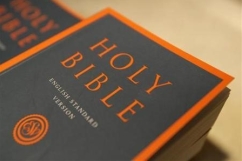The latest social media trend in criticising the Bible focuses on the apparent contradictions between the two accounts of Judas' death, in Matthew 27:3-8 and in Acts 1:18. In the first, Judas hangs himself, the priests buy the field, and it is named 'Field of Blood' because of the betrayal by Judas. In the second, briefer account, Judas buys the field first, falls to his death there, and it is named 'Field of Blood' because of Judas' death. These differing accounts have recently become a focus for attention on whether the New Testament is reliable, and no wonder. Biblical scholar Richard Longenecker believes that the difficulty of reconciling these two accounts is "often considered the most intractable contradiction in the NT". Yet this is hardly a new problem; Augustine was aware of the issue, and it is not much different from reconciling other differences within Acts itself, such as the three accounts of Paul's conversation in chapters 9, 22 and 26.
Most responsible commentators recognise that the two accounts can, in theory, be reconciled – but many would rather focus on the contradictions. It shows that we all need to chill out a little – we can still take the Bible as reliable on matters of faith (since it is in some sense God speaking to us) but we shouldn't worry too much about the errors (since it is written by fallible human beings, and they make mistakes).
But there is one rather large problem with this. The first is that the NT does not separate faith from facts. And the second is related: the things our faith rests on include the things that the NT claims actually happened. If these two stories are not reliable, what about the rest of Acts? Or the Gospels? In particular, what about the 'contradictions' between the accounts of Jesus' healings? Or the whole shape of his ministry (about five months in Mark, three years in John)? Or his trial and crucifixion? Or the resurrection – was there one angel (Mark) or two (Matthew)? Two women or three? The women first to the tomb, or the men? And did they say nothing, or tell the others...? And so on. If these accounts cannot be reconciled, how can we be confident that any of this happened at all? Shouldn't we agree with the sceptics and admit that the NT writers are making it up and are not interested in the facts about what happened?
In fact, Matthew and Luke tell us that they are interested in facts, in their different ways. For Matthew, the story about Judas has a particular function in his narrative. He jumps ahead to this episode, before returning to Jesus' trial (Luke's order in Acts is more logical) in order to contrast Judas' remorse with Peter's repentance, and show how Jesus' words are fulfilled – and that all of this 'fulfils' the Scriptures. So he follows up the story of Judas with a quotation from Jeremiah. Except that the quotation incorporates elements from Zechariah as well, and doesn't actually fit the story very well! As with Matthew's other examples of 'fulfilment' (particular in the birth narratives), the fit looks rather forced. If Matthew was making the narrative up, then he could have done a much better job – and the logical conclusion from this is that he is making the 'fulfilment' fit the facts, rather than the other way around. The facts do matter.
Luke, in his own way, is also making this point. Having noted that others have offered their own versions, he sets out to provide his own account from eye-witness research so that his readers might be confident in what they have heard (Luke 1:1-4). In this aside about Judas (which most English versions put in brackets), he includes a puzzling little phrase (me oun) which suggests that he is filling out some detail for a story that his readers might have heard elsewhere. It looks very much like he wants to fill in some facts!
To see what is going on here, let me give you an illustration from my own experience. I was recently rather late getting to the station for a train, and was very hot and bothered as I jumped on and found my seat. There was no refreshment service on the train, but the person opposite me was very kind and offered me his bottle of water. When I opened my Bible for the reading of the day I found this: "Truly I tell you, anyone who gives you a cup of water in my name because you belong to the Messiah will certainly be rewarded" (Mark 9:41). Moral of the story? God speaks through Scripture into our situations.
Or another story. I usually cycle to the train station, but on one occasion hadn't done so for several weeks. The night before I thought to myself 'You really ought to check the bike.' But I couldn't be bothered and left it till the morning. When I got the bike out, disaster – it had a flat tyre! I pumped it up, cycled like the wind, and arrived at the station as the train pulled in! Moral of the story? Prepare ahead of time – though even if you don't, God will provide a way.
In fact, those are two stories are about the same event – but you'd be hard-pressed to tie them together, not least because the two trains mentioned were not the same, but connecting trains, and the full story wouldn't quite agree with either. So the question might arise: what was the true story of my journey that morning? Can the two accounts be reconciled? When we tell stories, we edit them and condense detail in order to draw out a particular point, and this is the way that the gospel writers use their material – often in an even more condensed way, since they use many fewer words than we would today.
This points to something essential about the nature of Scripture. To talk of Scripture as 'inerrant' might fit if it were just a rule book, or a car maintenance manual – but it is neither, and I would agree with those who suggest such thinking represents a category error. In his Models of Scripture, John Goldingay points out the different ways that Scripture talks of itself. One of these is as 'witnessing tradition' – a testimony to what happened passed down faithfully to others. As a 'witness', the accounts of what happened have been edited, to draw out a point – the main one being that in Jesus, God has come and redeemed the world. But testimony always has to have a facticity about it; it has to offer a coherent account if it is to be taken seriously as a reliable witness. It might look difficult to reconcile the two accounts some way or another – but for me, it is vital that this is possible, even if it not the first thing that I want to do with these texts.
If they cannot be reconciled – if they are not at some level reliable accounts of what happened – then they are not a credible witness. And if they are not, then they cannot tell me the truth about Jesus Christ.
Rev Dr Ian Paul is associate minister at St Nic's, Nottingham, and Honorary Assistant Professor at the University of Nottingham. He blogs at www.psephizo.com and tweets at @Psephizo.


















